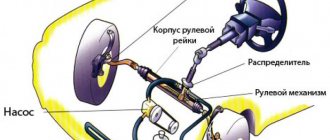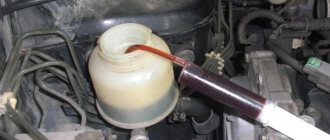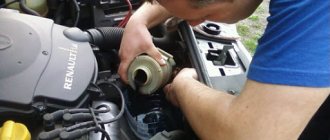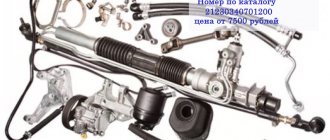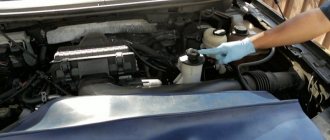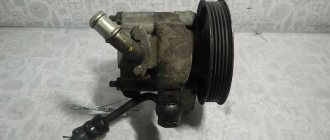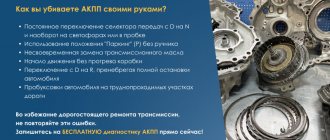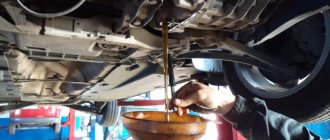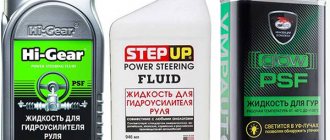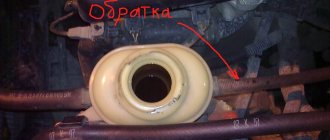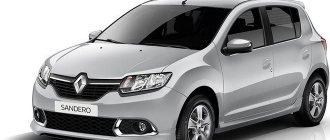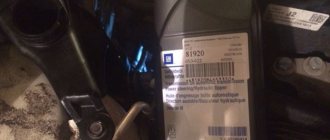In this article we will talk about what kind of fluid needs to be poured into the power steering reservoir. All types of oils will be considered: yellow, red, green. It is also worth paying attention to the regulations for replacing this lubricant. So what is the difference between lubricants intended for power steering, and how and when to change them? In this article you will find answers to all these questions.
Diagram of the power steering mechanism. The hydraulic pump, steering rack, and hydraulic oil reservoir are clearly visible
When is it necessary to change the power steering oil?
Most car manufacturers claim that power steering oil does not need to be replaced and is capable of performing its functions throughout the entire service life of the vehicle. In fact, this is not so: a lubricant for power steering is nothing more than a consumable; it, just like any other petroleum product, is subject to loss of performance.
The lubricant change interval is 1-2 years. This will extend the life of the hydraulic pump and also keep the steering wheel moving smoothly. The replacement schedule depends on the operating conditions: the greater the load, the more often it is recommended to change the lubricant in the mechanism.
The power steering oil is changed ahead of time due to a malfunction of any element of the power steering system. After replacing a failed part, the lubricant must be completely replaced. This is required for the coordinated operation of all elements - both old and newly installed.
Also, do not forget to check the hydraulic oil level in the power steering reservoir. This procedure is recommended to be performed once every 3 months. If the amount of liquid has decreased, it means that the mechanism has depressurized; in this case, it is necessary to perform a pressure test of the system, identify and eliminate the leak, and then add lubricant to the required level.
A universal lubricant for power steering, very convenient if you do not know what kind of hydraulic oil is in your mechanism
Operating principle of the steering gear
The VAZ 2107 is equipped with a worm-type steering gear. The principle of its operation is as follows.
The driver turns the steering wheel. The worm shaft is driven by cardan joints. It rotates, moving the double-ridge roller. Then the secondary shaft rotates, on which the bipod is fixed, driving the steering rods.
The trapezoid moves the steering knuckles, turning the wheels in the desired direction.
To reduce friction of the internal elements of the steering gear, transmission oil with a viscosity grade of SAE 75W-90, 80W-90 or 85W-90 is poured into the mechanism. The filling volume of the VAZ 2107 gearbox is 0.215 liters.
What kind of oil to pour into the hydraulic booster
The oil is poured into a special container - the power steering reservoir, it is easy to find under the hood
In order to understand this issue, you need to study the classification system of power steering oils. Most motorists, when choosing hydraulic oil, pay attention only to its color. This is not true. It is also necessary to keep in mind the base of the lubricant and its performance characteristics.
There are two types of oil based on it: mineral and synthetic. Each type of petroleum product has its own characteristics: mineral has its own advantages, synthetics have their own.
Mineral hydraulic oils are most often used, since they carefully preserve the rubber elements used in the power steering design, and such fluids effectively remove heat, protect friction pairs from wear and prevent the formation of corrosive deposits on mechanism elements.
Synthetic hydraulic oils are not particularly widespread in hydraulics. They contain rubber fibers, which contribute to the destruction of the rubber elements of the mechanism. Synthetics are mainly used in hydraulic boosters of special equipment, and its use in cars is permissible only with the recommendation of the manufacturer.
Manufacturers' recommendations table:
| car model | Recommended liquid |
| Audi 80, 100 (audi 80, 100) | VAG G 004 000 M2 |
| Audi A6 C5 (audi a6 c5) | Mannol 004000, Pentosin CHF 11S |
| Audi a4 (audi a4) | VAG G 004 000M2 |
| Audi a6 c6 (audi a6 c6) | VAG G 004 000M2 |
| BMW e34 (BMW e34) | CHF 11.S |
| BMW E39 (BMW E39) | ATF Dextron 3 |
| BMW E46 (BMW E46) | Dexron III, Mobil 320, LIQUI MOLY ATF 110 |
| BMW E60 (BMW E60) | Pentosin chf 11s |
| BMW x5 e53 (BMW x5 e53) | ATF BMW 81 22 9 400 272, Castrol Dex III, Pentosin CHF 11S |
| VAZ 2110 | Pentosin Hydraulic Fluid (CHF,11S-tl, VW52137) |
| VAZ 2112 | Pentosin Hydraulic Fluid (CHF,11S-tl, VW52137) |
| Volvo s40 (volvo s40) | Volvo 30741424 |
| Volvo xc90 (volvo xc90) | VOLVO 30741424 |
| Gas (Valdai, Sobol, 31105, 3110, 66) | Mobil ATF 320, Castrol-3, Liqui moly ATF, DEXTRON III, CASTROL Transmax Dex III Multivehicle, ZIC ATF III, ZIC dexron 3 ATF, ELF matic 3 |
| Gazelle business | Mobil ATF 320, Castrol-3, Liqui moly ATF, DEXTRON III, CASTROL Transmax Dex III Multivehicle, ZIC ATF III, ZIC dexron 3 ATF, ELF matic 3 |
| Gazelle next | Shell Spirax S4 ATF HDX, Dexron III |
| Geely MK | ATF DEXRON III, Shell Spirax S4 ATF X, Shell Spirax S4 ATF HDX |
| Geely Emgrand | ATF DEXRON III, Shell Spirax S4 ATF X, Shell Spirax S4 ATF HDX |
| Dodge Stratus | ATF+4, Mitsubishi DiaQueen PSF, Mobil ATF 320 |
| Daewoo Gentra | Dexron-IID |
| Daewoo matiz | Dexron II, Dexron III |
| Daewoo Nexia | Dexron II, Dexron III, Top Tec ATF 1200 |
| Zaz chance | LiquiMoly Top Tec ATF 1100, ATF Dexron III |
| Zil 130 | T22, T30, Dexron II |
| Zyl bull | AU (MG-22A), Dexron III |
| Kamaz 4308 | TU 38.1011282-89, Dexron III, Dexron II, GIPOL-RS |
| Kia Carens | Hyundai Ultra PSF-3 |
| Kia rio 3 (Kia rio 3) | PSF-3, PSF-4 |
| Kia Sorento | Hyundai Ultra PSF-III, PSF-4 |
| Kia Spectra | Hyundai Ultra PSF-III, PSF-4 |
| Kia Sportage | Hyundai Ultra PSF-III, PSF-4 |
| Kia Cerato | Hyundai Ultra PSF-III, PSF-4 |
| Chrysler PT Cruiser | Mopar ATF 4+ (5013457AA) |
| Chrysler Sebring | Mopar ATF+4 |
| Lada Largus | Mobil ATF 52475 |
| Lada Priora | Pentosin Hydraulik Fluid CHF 11S-TL VW52137, Mannol CHF |
| Land Rover Freelander 2 | LR003401 pas fluid |
| Lifan smiley (lifan smily) | Dexron III |
| Lifan solano | Dexron II, Dexron III |
| Lifan X60 (lifan x60) | Dexron III |
| Maz | BRAND R (Oil MG-22-V) |
| Mazda 3 | Mazda M-3 ATF, Dexron III |
| Mazda 6 (mazda 6 GG) | Mazda ATF MV, Dexron III |
| Mazda cx7 (Mazda cx7) | Motul Dexron III, Mobil ATF320, Idemitsu PSF |
| Man 9 (Man) | MAN 339Z1 |
| Mercedes w124 (mercedes w124) | Dexron III, Febi 08972 |
| Mercedes w164 (mercedes w164) | A000 989 88 03 |
| Mercedes w210 (mercedes w210) | A0009898803, Febi 08972, Fuchs Titan PSF |
| Mercedes w211 (mercedes w211) | A001 989 24 03 |
| Mercedes Actros | Pentosin CHF 11S |
| Mercedes atego (mercedes atego) | Dexron III, Top Tec ATF 1100, MV 236.3 |
| Mercedes ML (mercedes ml) | A00098988031, Dexron IID, MB 236.3, Motul Multi ATF |
| Mercedes sprinter | Dexron III |
| Mitsubishi Outlander | Dia Queen PSF, Mobil ATF 320 |
| Mitsubishi Galant | Mitsubishi Dia Queen PSF, Mobil ATF 320, Motul DEXRON III |
| Mitsubishi Lancer 9, 10 (Mitsubishi Lancer) | Dia Queen PSF, Mobil ATF 320, Dexron III |
| Mitsubishi Montero Sport | Dexron III |
| Mitsubishi Pajero | Dia Queen PSF, Mobil ATF 320 |
| Mitsubishi Pajero 4 | Dia Queen PSF, Mobil ATF 320 |
| Mitsubishi Pajero Sport | Dia Queen PSF, Mobil ATF 320 |
| Mtz 82 | in summer M10G2, M10V2, in winter M8G2, M8V2 |
| Nissan Avenir | Dexron II, Dexron III, Dex III, Castrol Transmax Dex III Multivehicle |
| Nissan ad | NISSAN KE909-99931 "PSF |
| Nissan Almera | Dexron III |
| Nissan Murano | KE909-99931 PSF |
| Nissan Primera | ATF320 Dextron III |
| Nissan Teana J31 (Nissan Teana J31) | Nissan PSF KLF50-00001, Dexron III, Dexron VI |
| Nissan Cefiro | Dexron II, Dexron III |
| Nissan Pathfinder | KE909-99931 PSF |
| Opel Antara | GM Dexron VI |
| Opel Astra H (opel astra H) EGR | OPEL PSF 19 40 715, SWAG 99906161, FEBI-06161 |
| Opel Astra J | Dexron VI, General Motors 93165414 |
| Opel Vectra A | Dexron VI |
| Opel Vectra B | GM 1940771, Dexron II, Dexron III |
| Opel Mokka | ATF DEXRON VI" Opel 19 40 184 |
| Peugeot 206 | Total Fluide AT42, Total Fluide LDS |
| Peugeot 306 | Total Fluide DA, Total Fluide LDS |
| Peugeot 307 | Total Fluid DA |
| Peugeot 308 | Total Fluid DA |
| Peugeot 406 | Total Fluide AT42, GM DEXRON-III |
| Peugeot 408 | Total FLUIDE AT42, PENTOSIN CHF11S, Total FLUIDE DA |
| Peugeot partner | Total Fluide AT42, Total Fluide DA |
| Ravon Gentra | Dexron 2D |
| Renault duster | ELF ELFMATIC G3, ELF RENAULTMATIC D3, Mobil ATF 32 |
| Renault Laguna | ELF RENAULT MATIC D2, Mobil ATF 220, Total FLUIDE DA |
| Renault Logan | Elf Renaultmatic D3, Elf Matic G3 |
| Renault Sandero | ELF RENAULTMATIC D3 |
| Renault simbol | ELF RENAULT MATIC D2 |
| Citroen Berlingo | TOTAL FLUIDE ATX, TOTAL FLUIDE LDS |
| Citroen C4 (Citroen C4) | Total Fluide DA, TOTAL FLUIDE LDS, Total Fluide AT42 |
| Scania | ATF Dexron II |
| SsangYong New Actyon | ATF Dexron II, Total Fluide DA, Shell LHM-S |
| SsangYong Kyron | Total Fluide DA, Shell LHM-S |
| Subaru Impreza | Dexron III |
| Subaru Forester | ATF DEXTRON IIE, III, PSF Fluid Subaru K0515-YA000 |
| Suzuki Grand Vitara | Mobil ATF 320, Pentosin CHF 11S, Suzuki ATF 3317 |
| Suzuki Liana | Dexron II, Dexron III, CASTROL ATF DEX II multivehicle, RYMCO, Liqui Moly Top Tec ATF 1100 |
| Tata (truck) | Dexron II, Dexron III |
| Toyota Avensis | 08886-01206 |
| Toyota Carina | Dexron II, Dexron III |
| Toyota Corolla (Toyota Hiace) | Dexron II, Dexron III |
| Toyota Land Cruiser Prado 120 (Toyota Land Cruiser 120) | 08886-01115, PSF NEW-W, Dexron III |
| Toyota Land Cruiser Prado 150 (Toyota Land Cruiser 150) | 08886-80506 |
| Toyota Land Cruiser Prado 200 (Toyota Land Cruiser 200) | PSF NEW-W |
| Toyota Hiace | Toyota ATF DEXTRON III |
| Toyota Chaser | Dexron III |
| UAZ loaf | Dexron II, Dexron III |
| UAZ patriot, hunter | Mobil ATF 220 |
| Fiat Albea | DEXRON III, ENEOS ATF-III, Tutela Gi/E |
| Fiat Doblo | Spirax S4 ATF HDX, Spirax S4 ATF X |
| Fiat Ducato | TUTELA GI/A ATF DEXRON 2 D LEV SAE10W |
| Volkswagen Vento | VW G002000, Dexron III |
| Volkswagen Golf 3 | G002000, Febi 6162 |
| Volkswagen Golf 4 | G002000, Febi 6162 |
| Volkswagen Passat B3 | G002000, VAG G004000M2, Febi 6162 |
| Volkswagen Passat B5 (Volkswagen passat B5) | VAG G004000M2 |
| Volkswagen Transporter T4, T5 (Volkswagen Transporter) | VAG G 004 000 M2 Power Steering Fluid G004, Febi 06161 |
| Volkswagen Touareg | VAG G 004 000 |
| Ford Mondeo 3 (ford mondeo 3) | FORD ESP-M2C-166-H |
| Ford Mondeo 4 | WSA-M2C195-A |
| Ford transit | WSA-M2C195-A |
| Ford Fiesta | Mercon V |
| Ford Focus 1 | Ford WSA-M2C195-A, Mercon LV Automatic, FORD C-ML5, Ravenol PSF, Castrol Transmax Dex III, Dexron III |
| Ford Focus 2 | WSS-M2C204-A2, WSA-M2C195-A |
| Ford Focus 3 | Ford WSA-M2C195-A, Ravenol Hydraulik PSF Fluid |
| Ford Fusion | Ford DP-PS, Mobil ATF 320, ATF Dexron III, Top Tec ATF 1100 |
| Hyundai Accent | RAVENOL PSF Power Steering Fluid, DEXRON III |
| Hyundai Getz | ATF SHC |
| Hyundai Matrix | PSF-4 |
| Hyundai SantaFe | Hyundai PSF-3, PSF-4 |
| Hyundai Solaris | PSF-3, Dexron III, Dexron VI |
| Hyundai Sonata | PSF-3 |
| Hyundai Tucson/Tucson | PSF-4 |
| Honda accord 7 | PSF-S |
| Honda Odyssey | Honda PSF, PSF-S |
| Honda HRV | Honda PSF-S |
| Chery amulet | BP Autran DX III |
| Chery bonus | Dexron III, DP-PS, Mobil ATF 220 |
| Chery very | Dexron II, Dexron III, Totachi ATF Multi-Vehicle |
| Chery indis | Dexron II, Dexron III |
| Chery Tiggo | Dexron III, Top Tec ATF 1200, ATF III HC |
| Chevrolet Aveo | DEXTRON III, Eneos ATF III |
| Chevrolet Captiva | Power Steering Fluid Cold Climate, Transmax Dex III Multivehicle, ATF Dex II Multivehicle |
| Chevrolet Cobalt | DEXRON VI |
| Chevrolet Cruze | Pentosin CHF202, CHF11S, CHF7.1, Dexron 6 GM |
| Chevrolet Lacetti | DEXRON III, DEXRON VI |
| Chevrolet Niva | Pentosin Hydraulic Fluid CHF11S VW52137 |
| Chevrolet Epica | GM Dexron 6 No.-1940184, Dexron III, Dexron VI |
| Skoda Octavia tour | VAG 00 4000 M2, Febi 06162 |
| Skoda Fabia | Power Steering Fluid G004 |
When choosing a lubricant for power steering, the majority of motorists are guided only by the color factor. This can be done, but it is not necessary, because most lubricants of the same color have different bases and additive packages. Therefore, it is recommended to read about the miscibility of each liquid.
Red
Synthetic or mineral-based hydraulic oil is used in most automatic transmissions; it is rarely used in power steering systems. It is strictly forbidden to mix, since the lubricant has two types of base. So when purchasing such a lubricant, a complete replacement is required.
Yellow
This liquid is considered universal. This type of oil can be found in most hydraulic power steering systems. This lubricant is also used in manual and automatic transmissions.
Green
Synthetic or mineral based oil. For use exclusively in manual transmissions. You can use such a lubricant in power steering, but before doing this you need to drain all the old fluid and flush the system.
Color gradation of oils
Many motorists, when choosing what kind of fluid to fill in the power steering, focus only on the shade of the lubricant. Experts do not recommend doing this. It is also a mistaken belief that certain colored liquids can be mixed, but others cannot. Let's figure out how things really are.
Indeed, some liquids cannot be mixed, but you need to navigate here by composition, not shade. The fact is that today you can find mineral or synthetic lubricants of any color on sale. To avoid making a mistake, you need to be extremely careful.
Thus, red ATF is most often synthetic; the standard for such a liquid is Dexron from GM. What other fluids can be poured into the power steering? Many motorists trust brands such as Revenol, Motul, Shell, Zic, etc.
A yellow-colored lubricant manufactured at the Daimler plant (or under license) is used in power steering on Mercedes-Benz cars. It is divided into two types: synthetics and mineral water.
Green-colored lubricant is most often multifunctional and universal. Depending on the composition, it can be synthetic or mineral based. Suitable for power steering, suspension and other mechanisms operating on liquids.
Note!
It is prohibited to mix such lubricant with liquids of other colors. The exception is those situations when the instructions indicate that the lubricant is completely compatible. An example is Comma PSF MVCHF, such a liquid can be mixed with Dexron.
Differences between hydraulic fluids
Dexron. Lubricants have been produced since 1968. This is a separate class created by General Motors Corporation. Dexron is an official brand and is not manufactured exclusively by GM.
ATF (Automatic Transmission Fluid) - lubricants intended for automatic transmissions. Widespread among Japanese manufacturers. Often such hydraulic oil is found in power steering, most of it has a red tint.
PSF (Power Steering Fluid) – oil for hydraulic booster.
Multi HF are universal hydraulic oils for use in hydraulic power steering systems, allow complete mixing and interchangeability, and have approvals from many automakers. This oil is the best choice when purchasing.
Replacement frequency
Most car manufacturers recommend replacing this technical fluid after 80-100 thousand kilometers.
However, it is not always worth sticking to this rule. In machines that are operated in difficult climatic conditions and are subject to other serious loads, it is better to reduce the period between replacements.
Much depends on the weather conditions in the region and how the machine is used. It is important to monitor not so much the mileage on the odometer as the condition of the lubricant.
Changing power steering oil - description of the process
Replacing the lubricant in the power steering is a rather painstaking task; you should take the procedure seriously and follow the instructions.
Adding fluid
To add oil, it is recommended to purchase Multi HF universal fluid, since it can be mixed with absolutely any lubricant.
Instructions for adding hydraulic lubricant to the power steering:
- Inspect the power steering reservoir and mechanism for leaks. If there are any, they need to be eliminated;
- Check the hydraulic oil level in the power steering reservoir;
- After removing the plug, add fluid to about;
- Start the engine and turn the steering wheel from the extreme left to the extreme right;
- Check the lubricant level in the power steering reservoir and, if necessary, top up to about.
Complete fluid change
A complete lubricant change requires great perseverance and coordination. Hydraulic oil must be selected based on the manufacturer’s recommendations.
- Hang up the car. This is done to facilitate rotation of the steering wheel when the engine is off;
- We will need a syringe - we need to pump out all the fluid from the power steering reservoir;
- Then loosen the clamps on the hoses, remove them from the tank, rinse the container itself thoroughly;
- Direct the return line (steering rack hose) into an empty jar - the liquid remaining in the rack will drain there;
- By turning the steering wheel, remove any remaining lubricant from the mechanism. It is required to make quite intense and prolonged movements with the steering wheel;
- After the hydraulic oil stops leaking, you need to fill (rinse) the rack with freshly purchased fluid. To do this, insert a funnel into the second hose and fill it to capacity;
- After this, we repeat the manipulations with the steering wheel again. When all the oil has flowed out of the return hose, the procedure can be completed;
- Then reassemble the hydraulic power steering system in reverse order;
- Fill the mechanism reservoir with oil according to the level;
- After the system is filled, you need to turn the steering wheel from the extreme left position to the extreme right. Such manipulations should be carried out with the engine running;
- We turn off the engine, lower the car, check the tightness of the connections, and add fluid to the amplifier tank to the maximum.
Belt Drive Power Steering Pump
Terms of use of liquids
It is also worth taking care of how to change the oil in the hydraulic booster. Such information is always contained in the car’s service book. No less often, manufacturers recommend not changing this oil at all. They are guided by a simple rule: the service life of the mixture is designed for the average life of the machine.
But a car can serve faithfully for quite a long time. If the fluid is not original, it needs to be changed more often. Some manufacturers clearly prescribe the procedure for replacing the fluid, including taking into account cases when the composition is not original. Often the control period ranges from 50 to 100 thousand kilometers.
If there is a problem with the power steering system, the first thing you need to do is change the oil. It is also worth checking the condition of the fluid in the power steering. If it has darkened, thickened, or smells unpleasant, it needs to be changed. By the way, synthetic compounds can be used much longer.
TOP 10 best power steering fluid manufacturers
In general, it is worth noting the fact that choosing power steering oil is a rather complicated matter. The main thing is to choose a lubricant that is suitable for the car. To do this, you should use the recommendations of the manufacturer, and you should also carefully check the authenticity. It is very easy to run into a fake, so it is recommended to buy oil only in trusted stores.
Below is the TOP 10 best power steering fluid manufacturers:
- Motul is a manufacturer of luxury oils of any category. Hydraulic oils are no exception;
- Pentosin is a fluid used by most German automakers, it is of high quality and has a long service life;
- Castrol is a global manufacturer of auto chemicals. By filling the power steering with Castrol lubricant, you can be sure of the high-quality operation of the system;
- Mobil is a concern that deals with petroleum products for automobiles. High quality power steering lubricants;
- Comma makes excellent hydraulic power steering fluids. Oils from this manufacturer have a huge number of approvals from auto giants;
- RAVENOL - hydraulic oils are of high quality and low price;
- LIQUI MOLY - their power steering lubricants have good zinc-free additive packages and a high-quality base;
- Febi is a manufacturer of good fluids for the most demanding automatic transmissions and power steering;
- Mannol - a line of budget and high-quality lubricants;
- ENEOS is a Japanese manufacturer of petroleum products for automatic transmissions and power steering.
All of the above manufacturers have gained an impeccable reputation among car enthusiasts. Their oils have high performance qualities, stable viscosity values and good anti-wear additive packages.
If you have any questions, leave them in the comments below the article. We or our visitors will be happy to answer them
